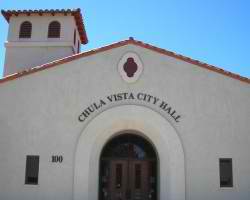The Chula Vista City Council unanimously agreed to change the city’s municipal code regarding enforcement of illegal marijuana dispensaries to include criminal prosecution and allow fines in excess of $100,000 when warranted.
Chula Vista’s municipal code from 2011 prohibits marijuana dispensaries from entering the city. Despite the prohibition, pot shops continue to pop up in the city.
In Chula Vista there are 11 illegal pot shops, six of them in Southwest Chula Vista.
Currently the city imposes civil sanctions against pot shop owners for zoning code violations. Dispensary owners are typically fined up to $1,000 a day for violating city code. Those who continue to operate despite the civil penalties are usually subject to a civil lawsuit.
But City Attorney Glen Googins said criminal punishment is needed because the city’s current policy is not keeping dispensary owners away.
“Many involved in the cannabis industry show a blatant disregard for the law. They don’t care that their businesses are prohibited,” Googins said. “The industry is so lucrative that when fines are imposed it’s not a deterrent because they have the money to pay them. When lawsuits are filed, they have the money to pay specialized attorneys to frequently hide their identities and drag out the legal process. This allows them to prolong their very lucrative operations and make still more money.”
Chula Vista Police Capt. Lon Turner said having an illegal dispensary could result in a misdemeanor conviction and prosecution and will only apply to those offenders who refuse to leave after ignoring the city’s civil sanctions.
Deputy City Attorney Megan McClurg said the criminal legal process works more quickly than the civil process, which often takes up to two years before a decision is made in court and ultimately the dispensary is shut down.
Vista is the only other city in the county that enforces criminal action against dispensary owners.
In February 2015 the city filed civil lawsuits against four dispensaries asking for injunction orders and requesting civil penalties and cost.
Since 2012 when active enforcement started, Googins said the city has collected nearly $400,000 in fines from dispensary owners who violate the law.
Googins said that money goes into the city’s general fund to offset costs for enforcement.
Mayor Mary Casillas Salas said shutting down illegal pot shops costs the city plenty of resources.
“The enforcement of all of this does cost a lot of money,” she said. “It entails a lot of human resources so it is a big financial drain on the city of Chula Vista to try to get these places shut down and so it is a real frustrating thing for us because it just seems like these illegal operators have no end to the money supply and they can just throw all that they have against us and then we’re there having to spend precious public resources to try and shut them down.”
Eastlake resident David Blair legally co-owns the dispensary A Green Alternative in the city of San Diego. Blair said he is all for dispensaries if they go through the right process to open legally. He said illegal dispensaries bring nothing but trouble as they sell other drugs like bath salts.
Blair said illegal dispensaries have their employees working under the table so they do not have to pay for medical insurance or Workers Compensation. He also said illegal dispensaries are open around the clock while his legal dispensary is only open from 9 a.m. to 8 p.m.
Former Chula Councilman Rudy Ramirez, who lead a protest against pot shops several weeks ago, said while criminal prosecution is a step in the right direction, he would like the City Council to regulate the cannabis industry and keep marijuana away from minors and people who are not permitted to use it.
“If these are medical marijuana dispensaries and marijuana is a medicine, then we have to treat it like a medicine and regulate it like a medicine,” he said. “If it’s going to be legal because of the state action as a recreational drug then it should be regulated like a recreational drug in the same way that alcohol is and taxed appropriately.”












